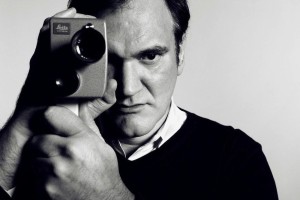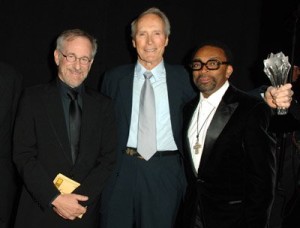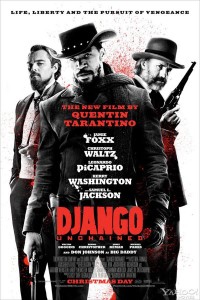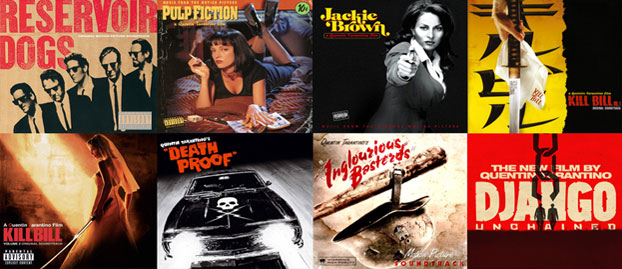Throughout his career, Quentin Tarantino has been dogged by criticism over his Tourette’s-like use of the word “nigger” in his films.
Therefore, it’s noteworthy that he decided to finally address this criticism. He did so in an interview with Bret Easton Ellis as part of a lengthy profile for the October 12 edition of the New York Times’ T Magazine.
Except that, in the piece headlined, “The Gonzo Vision of Quentin Tarantino,” he did little more than dismiss his “Black critics” with indignation and contempt.
 Here, in part, is what he said:
Here, in part, is what he said:
[W]hen the Black critics came out with savage think pieces about [Django Unchained], I couldn’t have cared less…
If people don’t like my movies, they don’t like my movies, and if they don’t get it, it doesn’t matter…
You wouldn’t think the color of a writer’s skin should have any effect on the words themselves.
Unlike his Black critics, I have no problem with Tarantino using the n-word … in his movies. Not least because I can think of no better way to portray a character’s racism and ignorance than to have him spew that racial slur, wantonly.
Indeed, Whites are loath to utter this word in polite society, especially in the company of Black folks, for good reason. It follows that Whites who do are labeled racists – with all of the social scorn and sanction that entails … and rightly so.
But Tarantino undercut his artistic license by feigning ignorance about the racial effect/perception that obtains when he, a White writer, laces his script with the n-word. Race matters, and he knows it.
As a matter of fact, I would have found Tarantino’s take on his use of this word more palatable if he had been interviewed for this profile by a critically acclaimed Black writer like Ta-Nehisi Coates. Not least because Coates explores the legacy of America’s original sin in such books as Between the World and Me, whereas Ellis, a critically acclaimed White writer, explores the American zeitgeist of amoral sex, drugs, and violence in such books as American Psycho.
All the same, “Gonzo” is the operative word in the headline. For nothing defines a Tarantino film quite like Hunter S. Thompsonesque, stream-of-consciousness dialogue and orgiastic violence, which reflect his twisted mind more than anything in real life. But there’s no denying his talent as a movie writer, producer, and director—as his two Oscars and two Golden Globes duly attest.
But there’s no denying his talent as a movie writer, producer, and director – as his two Oscars and two Golden Globes duly attest.
In fact, no filmmaker has made a string of more entertaining movies over the past twenty years – as Reservoir Dogs, Pulp Fiction, Jackie Brown, Kill Bill (Vols. I and II), Inglourious Basterds, and Django Unchained duly attest.
And, ironically, no White filmmaker has featured more compelling Black characters – as Black actors Samuel L. Jackson, Pam Grier, and Jamie Foxx duly attest.
Yet filmmaker Spike Lee, novelist Ishmael Reed, and columnist Jelani Cobb have led a chorus of Black critics who, over the years, have decried Tarantino’s use of the n-word. My reading of their criticism is that he writes as if there is no difference between the “racist licks” and the profanities he laces throughout his scripts.
But here is how I addressed such criticism, with respect to Tarantino’s Academy Award-winning Django Unchained no less, in “The Oscars: My Picks,” February 13, 2013.
____________________
You’ve probably heard Spike Lee, the director of such ‘racially affirming’ films as She’s Gotta Have It and Jungle Fever, spewing indignation about Django Unchained being ‘disrespectful to my ancestors’ – as he is quoted saying in the December 21, 2012, edition of Vibe magazine. It speaks volumes about his professional integrity and intellectual curiosity, however, that he boasted about having no intent to ever see this film by (White) director Quentin Tarantino.
 But all you need to know is that Lee spewed equally vacuous criticism about the Academy Award-winning film The Color Purple by (White) director Steven Spielberg. Not to mention his demonstrably uninformed fulmination about Academy Award-winning director Clint Eastwood not including one Black soldier in his two films about Iwo Jima, namely Letters From Iwo Jima and Flags of Our Fathers…
But all you need to know is that Lee spewed equally vacuous criticism about the Academy Award-winning film The Color Purple by (White) director Steven Spielberg. Not to mention his demonstrably uninformed fulmination about Academy Award-winning director Clint Eastwood not including one Black soldier in his two films about Iwo Jima, namely Letters From Iwo Jima and Flags of Our Fathers…
The only plausible explanation for his criticism in each case is race-based envy and resentment. (I addressed Lee’s race-baiting ignorance in this latter respect more fully in “Spike Lee vs. Clint Eastwood Over No Blacks in War Movies,” June 10, 2008.)
All the same, criticizing Tarantino for having his White characters use the word ‘Nigger’ too many times in Django Unchained is rather like criticizing Spielberg for having his German characters use the word ‘Vermin’ too many times in Schindler’s List. The criticism in both cases reflects an insidious strain of political correctness that presumes even to rewrite history.
____________________
Incidentally, this is the same Clint Eastwood who directed Black actor Forest Whitaker in Bird, arguably the best film ever made about jazz. And, of course, jazz is Black America’s greatest gift to Western civilization … with all due respect to Straight Outta Compton and the legacy of hip-hop.
Alas, political correctness has led to the fetishization of the word “nigger.” Nothing betrays this Orwellian spectacle quite like the Black (er, African-American) thought police assigning racist connotations even to our once proud racial classification, “Black” – presuming to ban it.
But, to appreciate the absurd implications, imagine perverting James Brown’s classic from “Say It Loud – I’m Black and I’m Proud” (as I do), to “Say It Loud – I’m African American and I’m proud” (as one might … just to be politically correct).
Frankly, the amount of time, emotion, and effort Blacks waste policing the way Whites use the n-word would be far better spent policing the way Whites actually treat us. Not least because reaction to this racial slight could and should be enlightened indifference – perhaps based on this take on that famous nursery rhyme:
Sticks and stones may break my bones but words will never hurt me … unless I let them.
 Meanwhile, it seems Tarantino’s Black critics couldn’t care less about the way their criticisms of him infantilizes the Black actors who appeared in his films. After all, if lacing his scripts with the n-word is so offensive to Blacks, what does it say about demonstrably proud Blacks like Jackson, Grier, and Foxx that they were not offended…?
Meanwhile, it seems Tarantino’s Black critics couldn’t care less about the way their criticisms of him infantilizes the Black actors who appeared in his films. After all, if lacing his scripts with the n-word is so offensive to Blacks, what does it say about demonstrably proud Blacks like Jackson, Grier, and Foxx that they were not offended…?
The reason they weren’t, of course, is that, far from denigrating Blacks, Tarantino’s films invariably champion them. Which is far more than can be said about blacksploitation films by Black directors, including Spike Lee and Tyler Perry, which too often feature coonish stereotypes of Black folks.
Apropos of which, I would bet my life savings that every Black actor would prefer to play the Django character Foxx played in Tarantino’s Django Unchained than the Mookie one Lee himself played in Do the Right Thing.
That’s a wrap.
Related commentaries:
The Oscars…
